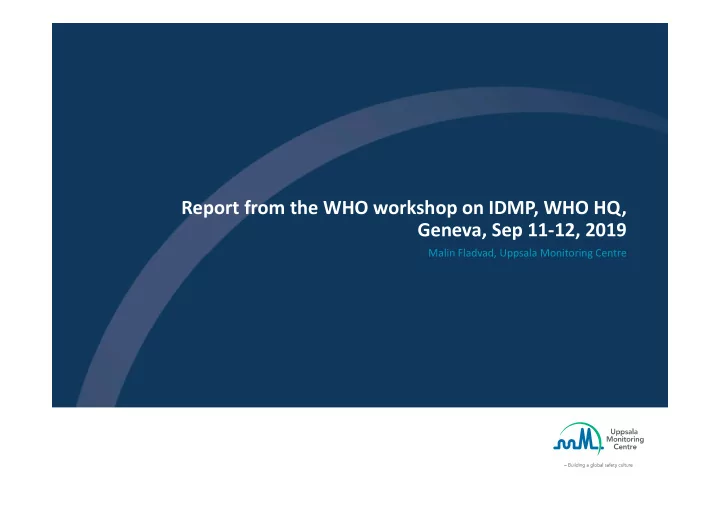

Report from the WHO workshop on IDMP, WHO HQ, Geneva, Sep 11-12, 2019 Malin Fladvad, Uppsala Monitoring Centre UMC confidential – internal use only
Aim of the workshop A clear articulation of the benefits and challenges of the maintenance of global PhPID Initial considerations for the necessary policy, processes, training and resources for scale-up of IDMP in different geographic and resource settings Consensus to establish a working group and initiate the development of a plan for the maintenance of global PhPIDs Elements of a framework for further outreach and collaboration in the global implementation of the IDMP standards UMC confidential – internal use only
Participants US-FDA Brazil EMA Morocco PMDA Nigeria Health Canada Thailand WHO IFPMA UMC UMC confidential – internal use only
Use cases identified for IDMP and global PhPID Pharmacovigilance including signal detection, medication errors & pharmacoepidemiological studies Reimbursement and purchasing • Comparing for example price differences between countries Stock-outs and shortages • Identify comparable products to be used Cross-border prescriptions Support information sharing in-between authorities • Identify products with the same ingredients in drug submissions and evaluations UMC confidential – internal use only
IDMP and implementation of global PhPID There is a risk for disharmony in the implementation of global PhPID with local solutions: • Local assignment for substance IDs • Local controlled vocabularies • Local variations of PhPID algorithms to fit local use case that can not be mapped to a global PhPID There is a need to adopt a proactive approach that will limit unnecessary local variations in the data UMC confidential – internal use only
A need of global control vocabularies to ensure consistency of global PhPID. A global PhPID needs global control vocabularies according to ISO 11238, ISO 11239 and ISO 11240 • Identified problem with dosage form according to ISO 11239 • Need for adaptations of EDQM to ensure global use • A global substance ID is a prerequisite for a global PhPID UMC confidential – internal use only
Use and maintenance of Global PhPID WHO proposal: The WHO collaborating centre, the Uppsala Monitoring Centre (UMC), take on the responsibility for the day-to- day operations of the global PhPIDs • WHO-UMC maintained global PhPIDs use global substance IDs, dose forms, strength and reference strength according to ISO standards • All users (regulators and industry) are able to use and request global PhPID • Users understand the different components of IDMP and use or map to global dose forms, strength and reference strength UMC confidential – internal use only
Use and maintenance of Global Substance ID WHO proposal: To form a working group to investigate the requirements for global substance registration. The group should define best practise for how to identify/validate new substances and the level of granularity needed for global substance registration UMC confidential – internal use only
Need for promotion of global consistency of IDMP Find out needs from different stakeholders regarding training, promoting and awareness • What investment is needed for each regulatory authority to start using IDMP? The following ideas were suggested regarding awareness and promotion: • Learn from what has been done already (e.g. FDA for G-SRS, EMA for EU-SRS) • Circulate information about webinars, e.g. FDA and EMA are broadcasting regularly • Create training material • Use IPRP to raise awareness of IDMP UMC confidential – internal use only
Nest steps: Global PhPID Work group for global PhPID: • to have frequent meetings to update on progress and discuss implementation approaches • to agree on next steps for global PhPID, including possible pilot and business case for WHO-UMC maintained global PhPID to give the background and value of the initiative • to elaborate on the use cases for global PhPID • investigate the feasibility of incorporating veterinary medicines into WHO-UMC maintained global PhPID Development of the global PhPID service should follow the pace of the development and implementation of IDMP in a stepwise and pragmatic approach UMC confidential – internal use only
Nest steps: Global Substance ID A separate group should define the objective, expertise and membership needed to form a working group for creation and maintenance of global substance IDs UMC confidential – internal use only
Nest steps: communication Present update at IPRP meeting in October and discuss possible collaboration with ISO/WHO. Developed communication material including work group minutes to be published on IPRP homepage No efforts should be duplicated, interact with other groups working with IDMP (ISO, IPRP etc) UMC confidential – internal use only
Recommend
More recommend